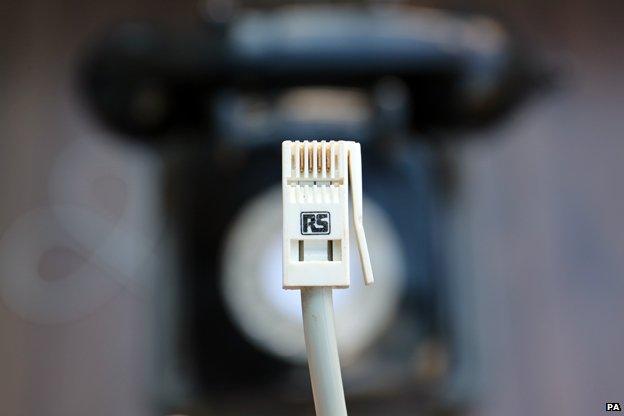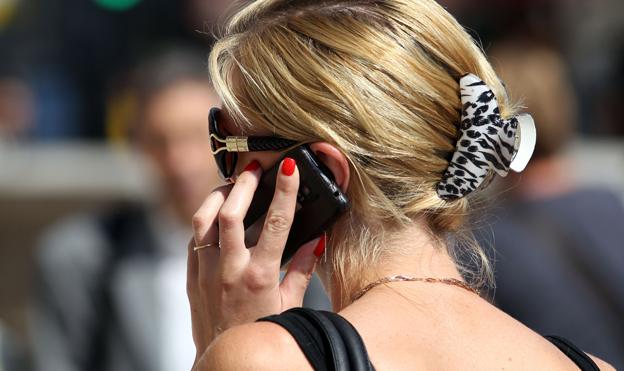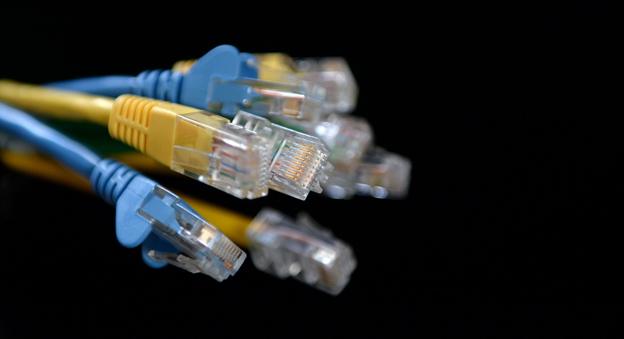Why are people charged for 'landline rental'?
- Published

Telecoms firms are increasing their charges for telephone line rentals. But why are broadband-only customers in the UK forced to pay for a line that can make phone calls?
Once upon a time owning a landline telephone was the only way to make instant contact with people outside your home.
But all that has changed. The rise of mobile phones, now used by 93% of the population, external, means fewer calls are made from landlines. By the first quarter of this year, 16% of UK homes no longer made landline calls, according to the industry watchdog Ofcom, external.
Still, every month millions of broadband customers are charged for line rental even if they do not use a home phone. This copper line provides connection to both the internet and the telephone network. Even fibre optic broadband typically comes down it for the last leg of its journey to your home (although Virgin, BT and other providers do offer completely fibre optic cabling to a small number of customers). The same charge amount usually applies whether a customer uses the line for telephone calls or broadband, or both.
"Why should we have to pay for a service we're not using?" Catherine West, former senior money researcher at the consumer group Which?, external has asked. "It seems a little unfair to say the least, and for many, a landline phone falls into this category. If you only use broadband, why must you pay for line rental?"
BT's explanation is this - whether you have the option of making the phone calls or not, the cost of maintaining the line is the same.
BT charges other firms who use the main Openreach network, external it provides. It does so on a set wholesale rate, which it effectively charges itself too. This, the company says, creates a fair system, where all providers contribute equally to the system's upkeep. Whether just broadband is used or a fuller package, the maintenance cost is largely the same for each line, it is argued, meaning this should be shown separately from call and internet usage charges.

Companies who use BT-owned lines pass on the cost to customers when the wholesale cost increases. For instance, Sky has raised its monthly line-rental charge from £15.40 to £16.40 for its Broadband Unlimited, Fibre Unlimited and Fibre Unlimited Pro packages. Talk Talk has increased its charge from £15.95 to £16.70
BT has raised the monthly cost of its standard line rental from £15.99 to £16.99 a month. Others are expected to increase their charges too.
For consumers, several other considerations are taken into account when choosing a provider, such as call costs and internet usage charges. But this should not mean landline rental rates, which are sometimes not promoted as highly as other costs, should be ignored, says Jeremy Cryer, broadband spokesman for the consumer website Go Compare.
"Landline charges vary between providers so you should weigh up whether it's cheaper for you to pay for a new landline to be connected with a new provider," he says.
BT-supplied landlines are not the only way to access broadband (and in Hull the lines belong to KCOM). Mobile networks can be used. People in rural areas with little or no signal can use satellite systems.
BT supplies the majority of home broadband firms with lines, but one company, cable giant Virgin, has installed its own separate, fibre-optic network across much of the UK.
The amount Virgin charges for what is listed as a "Virgin Phone line" is £16.99 for packages involving a landline and internet. But it does not include a specific line-rental charge in its broadband-only service, preferring to incorporate the cost of maintaining the system in its overall bills.
Might this system of billing be more comprehensible across the board for broadband-only customers, many of whom are young? The mobile research firm RootMetrics suggests 51% of 18 to 24-year-olds claim their mobile has already replaced their landline, external, compared with 17% of those aged over 55.
Danny Preiskel, senior partner at the law firm Preiskel and Co, which specialises in telecommunications law, says it "appears at first sight anachronistic" to list separate charges for users.

More from the Magazine

Even as mobile signals improve, with 4G spreading to more of the UK, overall demand for fixed lines is not declining. According to Ofcom, the number used by UK homes increased by 0.6 million last year to 25 million. But landline call volumes fell by 10.7%, following a 7.7% decline the year before.
"We expect all providers to present tariff information clearly and transparently to help customers make informed choices," an Ofcom spokesperson says. There is no suggestion that any provider has failed to do so.

Lines are not getting less popular, and the way most companies present charges is not altering. But the home telecoms market is - and pressure for change is unlikely to reduce.
Subscribe to the BBC News Magazine's email newsletter to get articles sent to your inbox.